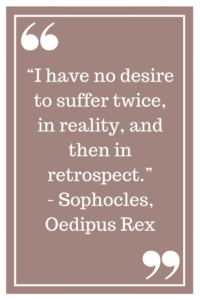“I have no desire to suffer twice, in reality, and then in retrospect.” – Sophocles, Oedipus Rex
Based on the Wikipedia definition, the term hindsight bias refers to the tendency to view events as more predictable than they really are. Before an event takes place, while you might be able to offer a guess as to the outcome, there is really no way to know what is really going to happen.
Hindsight Bias is the sense of knowing the outcome of an event before it happens – hence the term hindsight is 20/20. After a team loses a big game and remembering a previous premonition of them losing.
This hindsight bias phenomenon has been demonstrated in life events such as politics and sports. Hindsight bias is when people recall their predictions much stronger than they were prior to the event.
Hindsight Bias Examples
Waking up in the morning to a grey sky and having a sense that it’s going to rain. If it does rain, you find yourself thinking that you knew it was going to all along.
 Other examples from Psychologenie include:
Other examples from Psychologenie include:
- Having the feeling that you will forget something before leaving for a trip. When you arrive, you realize that you did in fact forget something and you view your premonition as you knew it was going to happen.
- A guy bets on a horse who is out of form at the race course with the off chance that he might win. The horse ends up winning, and the guy is convinced that he was totally sure about him winning and that he had predicted it.
What Causes Hindsight Bias?
There are three key variables that contribute to hindsight bias:
- First, there is a tendency to distort or wrongly remember an earlier judgement or thought. We then tend to believe that we really did know the answer all along.
- Second, is the tendency to view events as inevitable or bound to happen.
- Finally, the fact that the event could have been predicted – I knew it would happen.
A possible problem with this way of thinking is overconfidence. If there is a mistaken belief or premonition of success, we might become overly confident and take unnecessary risks. To counteract the hindsight bias, consider things that might have happened but didn’t. Reviewing the many potential outcomes that could have occurred but didn’t, can create a more balanced view of what really happened.












